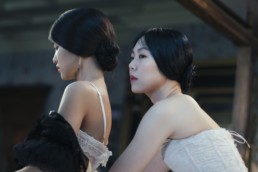‘The Handmaiden’ Is a Web of Lies, Deceit, and Sexual Tension
If you were not familiar with Park Chan-wook's impressive filmography before 'The Handmaiden', then you are in for a mind-blowing experience.
Often regarded as a Renaissance man of Korean cinema, Park Chan-wook does what all excellent filmmakers strive to do– create a technically engrossing and emotionally compelling story that resonates with its audience far after the credits are finished rolling.
“A story is all about the journey,” Uncle Kouzuki says to Count Fujiwara as he cuts off the Count’s fingers one by one, taking joy in the other man’s pain. The sex-obsessed and domineering Uncle, while deplorable in every way, speaks a ring of truth in his observation of what makes a good story, and in the case of director Park Chan-wook’s film The Handmaiden, the 2.5 hour journey we will embark on leads us through a tangled web of sexually-charged tension made even more complicated by the layers of lies and deceit, while remaining a shocking and, at its core, beautiful piece of cinema. Essentially, this is a film where predicting what will happen next is utterly pointless, so it’s best to just sit back and let Chan-wook be your guide throughout this multidimensional journey.
The scene is set during the 1930’s as a young Korean woman, Sookee (Kim Tae-ri), is chosen to work as a handmaiden to the young Japanese heiress Lady Hideko (Min-hee Kim). The Lady’s family have all passed away, leaving her the sole proprietor of the family’s fortune. Her first day on the job, Sookee meets the Lady at the beautiful, yet secluded, Korean estate where she lives with her much older Uncle Kouzuki (Jin-woong Jo)– who has made his plans of marrying her to inherit her wealth, clear. Both women are quickly drawn to each other, the lines of friendship become blurred and sexual tension arises, however, it is Sookee that is hiding an ulterior motive that may prove to be detrimental.
Before Sookee was hired as the handmaiden, she made her living as a forgery specialist and a pickpocket master. Seeing an opportunity to leave that life behind for good, Count Fujiwara (Jung-woo Ha) devised a plan to get Sookee close to the Lady, with the intention to convince the heiress to marry him instead of her Uncle. Soon after the Count and the Lady were to marry, he planned to put her in a mental hospital and keep all of her money to himself. He would give Sookee a cut of the wealth, as well as give her all of the Lady’s clothes and beautiful garments. In theory, Sookee knows that following through with the plan is her ticket out of her dead-end life, however, after inadvertently growing personally attached to and starting to fall in love with Lady Hideko, she questions everything she thought she knew and wanted.
The Handmaiden is cut into three distinct parts, and what I have just described only takes place in the first act. Needless to say, there is a lot more drama than unfolds in the second and third part. The second act delves deeper into the Lady’s childhood growing up alone and her relationship with her twisted uncle, a man who collects pornographic novels and forces his young niece to read them aloud to grown men. While the first act leaves the viewer with one sense of how the film is going to progress, the second act turns that theory on its head. We revisit scenes that occurred in the first act through a new lens in the second and third acts, proving that what you think you know, you really don’t.
Park Chan-wook’s phenomenal storytelling abilities are on heightened display here. Using the three-part structure to tell the same story through three very distinct characters gives the film a tangible sense of fullness. Scenes that seemed to be abruptly cut off at the height of sexual tension are revisited and followed through in later acts. Park Chan-wook doesn’t hold back from getting graphic, but he does so in a way that doesn’t feel overly pornographic for shock’s sake. The energy he creates from the environment, the characters, and the situations make for one truly unforgettable viewing experience.
All of the performances are effective and wildly entertaining, but it is the debut from actress Kim Tae-ri who plays Sookee that is truly mesmerizing. Tae-ri beat out over 1,500 other actresses for the part and it is to her advantage that she had little to no acting experience prior. Her demeanor can best be likened to Belle’s in Beauty and the Beast. Both have an innocence that is only intensified by their large, doe-eyes, but they are self-sufficient and have a backbone when they feel like they’re in jeopardy. This may be just a coincidence, but even Sookee’s outfit– a blue long-sleeved dress with a white apron– is reminiscent of the Disney princess.
If you were not familiar with Park Chan-wook’s impressive filmography before The Handmaiden, (credits include Oldboy and Thirst), then you are in for a mind-blowing experience. Often regarded as a Renaissance man of Korean cinema, Park Chan-wook does what all excellent filmmakers strive to do– create a technically engrossing and emotionally compelling story that resonates with its audience far after the credits are finished rolling. The Handmaiden should serve as an example of masterfully executed cinema from both sides of the camera. Despite The Handmaiden‘s rather lengthy runtime with both Japanese and Korean subtitles, this is the rare occurrence where I am actually looking forward to rewatching the film again, knowing that when I do, I’ll walk away with an even deeper appreciation of Park Chan-wook’s unique style.
‘The Handmaiden’ is not rated. 144 minutes. Now playing at ArcLight Cinemas, The Landmark, Laemmle Theaters, and more.
Morgan Rojas
Certified fresh. For disclosure purposes, Morgan currently runs PR at PRETTYBIRD and Ventureland.


